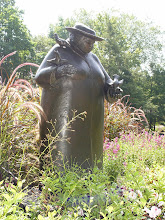but I am missing the palm and live oak forest patch we were wandering through last month at this time.
If all I were thinking about is avoiding snow and cold (and I'm thinking
about it more and more as my joints age and ache), I wouldn't be
feeling any qualms: humans have been a migratory species since we first
wandered north from the savannah however many centuries ago that was.
What I can't help wondering about is why even those of us with some
ecological awareness, who go out of our way to make our places as
wildlife-friendly as possible, still feel a longing for landscapes that
are anything but natural. For instance, when I think of a South Florida garden, my first image is something like this:
 Unfortunately, few of the plants in the picture originated anywhere near Florida. Less than five miles away from the botanical garden where the picture above was taken is a remnant hammock forest, with the real Florida "jungle" seen here.
Unfortunately, few of the plants in the picture originated anywhere near Florida. Less than five miles away from the botanical garden where the picture above was taken is a remnant hammock forest, with the real Florida "jungle" seen here.And I have to confess: from a purely aesthetic perspective, I prefer the giant philodendron and wild fuschia-colored thing to palmetto and resurrection fern and have no idea why.
Florida has perfectly good wildflowers (and lots of them, and they bloom at Christmas!), but most of us still associate Chinese hibiscus with Florida. They were in nearly every yard when I was a girl, and still are, if my in-laws' neighborhood is any indication.
We don't only do this with tropical plants and landscapes. West Virginia
and Ohio have plenty of wild roses, but the roses that make me drool
the most are of the antique European variety, like this "Duchesse de
Montebello."
In full bloom, a few hundred yards away, was an enormous patch of our native butterfly weed, generating not nearly so much interest from the humans despite its utter indestructible gorgeousness.


Given my general laziness, I suspect that there will be far fewer old roses and more prairie plants and forest trees in my future.






No comments:
Post a Comment